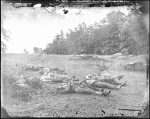OBERLIN
COLLEGE
Department
of History
| Gary Kornblith |
History
263
|
| King 141-G; x8526 |
Fall
1999
|
| E-mail: Gary.Kornblith@oberlin.edu |
AltaVista Forum: History 263 |
 |
The American Civil War and Reconstruction |
Less than a century after fighting for independence from Great Britain and establishing a federal republic, Americans turned their firearms on each other in the bloodiest war in the nation's history. At the end of hostilities, over six hundred thousand soldiers lay dead while approximately four million former slaves enjoyed legal freedom for the first time. Thereafter Americans struggled to reorganize their society and redefine their polity in response to the changes wrought by the Civil War's violence and to the conflicts that endured in peace.
This course focuses on three interrelated subjects: the causes of the Civil War; the dynamics of the war and emancipation; and the outcomes of the Civil War and Reconstruction. Beyond coverage of this subject matter, the course is designed to promote three major "student learning objectives":
- A grasp of important issues, trends, and controversies in recent scholarship on the Civil War and Reconstruction.
- An understanding of how historians develop interpretations based on research in primary sources and the application of analytic models.
- A capacity to make independent judgments after careful consideration of available evidence, alternative scholarly interpretations, and an honest reexamination of one's preconceptions and biases.
Throughout the semester, students are expected to draw their own conclusions about the meaning and significance of events that continue to provoke popular passions and intellectual argument more than a century after they occurred.



Format: The class meets regularly on Mondays and Wednesdays from 2:30 to 3:20 p.m. and on Fridays from 2:30 to 4:15 p.m. In general, Mondays will be devoted to group discussions of the assigned readings; Wednesdays will be devoted to historical research and analysis using computers; and Fridays will involve watching and discussing videos on the Civil War era.
Evaluation: Students will be graded on the basis of class participation, two position papers (4-5 pages), two research reports (4-5 pages), and one longer essay (8-10 pages). The basic formula for determining final grades will be 15% for each position paper, 15% for each research report, 25% for the longer essay, and 15% for class participation. The instructor reserves the right to exercise some discretion in assigning final grades. Update: Click for Dec. 3 announcement of alternative grading option.
Honor Code: All student work for this course is governed by the Honor Code. You are welcome, indeed encouraged, to collaborate with other members of the course in preparing your assignments, but the work you submit for evaluation should always be your own. When drawing on the research and ideas of others, you should give them credit via footnotes, endnotes, or parenthetical notations.
Purchases: The following books are available for purchase at the Co-op Bookstore.
- Frederick Douglass, Narrative of the Life of Frederick Douglass (required)
- John Ashworth, Slavery, Capitalism and Politics in the Antebellum Republic, vol. 1 (required)
- James Oakes, The Ruling Race (required)
- Michael F. Holt, The Political Crisis of the 1850s (required)
- Gabor S. Boritt, ed., Why the Civil War Came (recommended)
- Don E. Fehrenbacher, ed., Abraham Lincoln: A Documentary Portrait (recommended)
- James M. McPherson, For Cause and Comrades (required)
- Gerald Linderman, Embattled Courage (recommended)
- Eric Foner, A Short History of Reconstruction, 1863-1877 (required)
- Laura F. Edwards, Gendered Strife and Confusion (required)
AltaVista Forum: To advance the intellectual quality and collaborative dynamics of the class, students are required to contribute substantively at least once per week to online discussions on AltaVista Forum. These contributions will count as part of the "class participation" element in the determination of final grades.